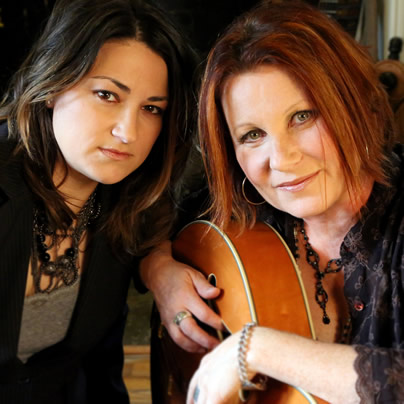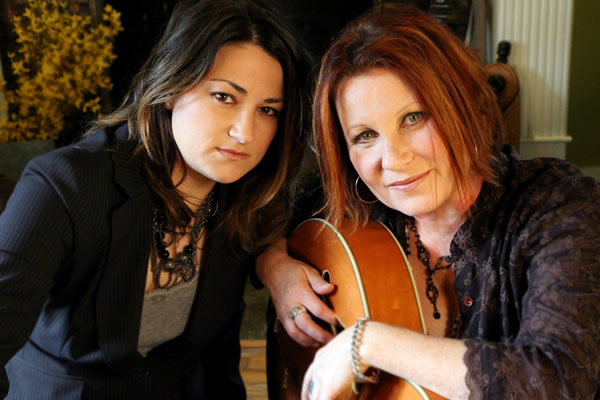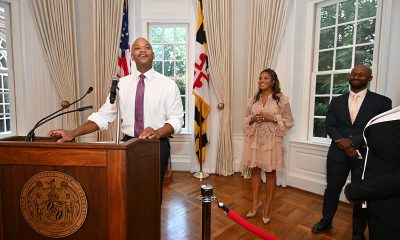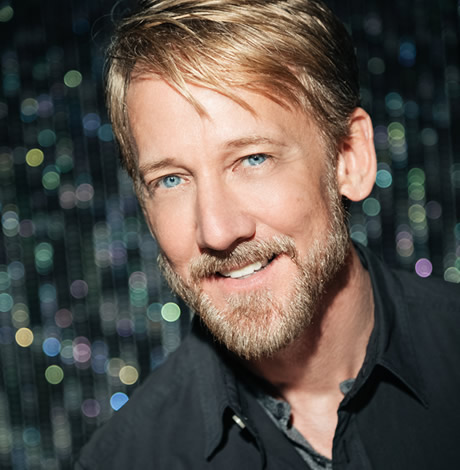Arts & Entertainment
Sisters in spirit
Gospel music vets Knapp, Becker unite for Christmas album, tour

Margaret Becker and Jennifer Knapp
‘The Hymns of Christmas Tour’
Monday, 7:30 p.m.
The Birchmere
3701 Mount Vernon Ave.
Alexandria, VA
$25

Margaret Becker (right) a veteran of gospel music with classic albums like ‘Immigrant’s Daughter’ and ‘Simple House’ in her canon, just finished a Christmas album with Jennifer Knapp, a gospel artist who emerged in the late ’90s. (Photo by Heidi Groff; courtesy Jay Jones Music)
Any touring musician will tell you life on the road — even when you can afford first class all the way — can get to you after years of going through the endless recording/promoting/touring/repeat cycle.
Two gospel music veterans who, at different times and to varying degrees, each spent years out of the limelight, are back with a wildly unexpected joint project — an album called “The Hymns of Christmas.” On it, Margaret Becker and Jennifer Knapp trade leads and harmonies and enjoy what they say is great musical repartee. They’re half-way through a 14-date mini-tour to support it and play the Birchmere in Alexandria, Va., Monday night.
Knapp, 38, released her first major label album to the Christian market in 1998 and worked solidly touring and recording through 2002 at which time she went on a long hiatus, moved to Australia and pretty much gave up any thoughts of continuing her career. She came out as a lesbian in April 2010 and released a comeback album called “Letting Go.” She maintains her Christian faith but says, though she doesn’t claim to be a theologian, she believes many of the scriptures traditionally used to condemn gays have been misunderstood and misinterpreted.
Becker, 53, was practically peerless among Christian music women rockers in her heyday. She released her first album in 1987 and though she recorded plenty of ballads and exhibited tremendous songwriting prowess, Becker always rocked harder than her contemporaries like Amy Grant or Twila Paris. Becker enjoyed a great run throughout the late ‘80s and ‘90s but slowed down tremendously by the ‘00s. Her new effort with Knapp is her first new album since 2007’s “Air.”
During a lunch break last week between back-to-back shows in Canton, Ohio and Indianapolis, Knapp fields a bevy of questions on how she has settled into being an openly gay singer, the collaboration with Becker and how it came about and what fans can expect from their show next week at the Birchmere.
It’s a highly non-glam tour and Knapp makes no attempt to hide it. They’re sharing a van and Becker is in line getting lunch at a Subway while Knapp answers Blade questions. Though the interview is with Knapp, Becker quickly follows up with e-mail inquiries later in the day.
“It’s just gonna be Margaret and I with a couple of acoustic guitars, but don’t let that fool you,” Knapp says. “It’s one of the most fun times I’ve ever had and it’s not gonna be some pared down girly acoustic thing. It’s gonna be a really good, full-voiced night. It shocks me when I look over at her and see how much she gives each night.”
Though not as active as she formerly was, Becker still speaks at religious women’s events and participates in hymn recording projects. Her audience is very much part of the Nashville-based contemporary Christian industry, the ranks of which both she and Knapp came through.
The two met in about 2000 when they both participated in a pair of multiple-artist projects and became friends. Knapp, who long has admired Becker, says it took no arm-twisting to convince Becker to record and tour with her, though many gospel fans turned their back on Knapp.
“Fortunately it’s not really an issue we’ve had,” Knapp says. “Tonight’s going to be a prime example. We’re playing at a United Methodist church in Indianapolis. It will be a lovely Christmas evening and the last thing we’ll be talking about is our sexual orientation. It’s a huge step for that church to host somebody like me and just proceed as if it’s business as usual but I think we’re seeing that more and more in terms of the public consciousness. I think we saw that in this last election. It’s great that people can take that and not draw this unusual amount of attention to it. That’s really the extraordinary part of it.”
Becker, in an e-mail exchange, says she’s not finding fans and those coming to the shows to be inferring anything about her life or ministry by her collaboration with Knapp.
“The audiences who are supporting this are music lovers who recognize when the work is symbiotic and complementary,” Becker says. “We’ve played this tour to those people, groups that I consider to be overlapping supporters from both of our bases. They are respectful and come for the music and spirit or the art of the material. I don’t think they give it much more thought than that and to me, that’s perfect. That’s how it should be.”
For the record, Becker declines to comment on her own sexual orientation. “My personal life is private and I’m very happy,” she wrote in an e-mail via her publicist. “I am very supportive of Jennifer and this musical partnership we’ve created and look forward to sharing it with her supporters and mine.”
The album features mostly acoustic arrangements of traditional church classes like “Hark the Herald Angels Sing,” “The First Noel,” “What Child is This,” “Silent Night” and more. Neither artist had recorded a Christmas album before and now that both are again living in the Nashville area, they decided this summer to go ahead and make it happen.
“We finally said, ‘Let’s just do it, let’s just get it done,’” Knapp says. “There was no pressure to write anything new, they’re all hymns so there’s a great wealth of material there and lots of opportunities for us to harmonize. We just decided to put our money where our mouth was and go ahead and do it.”
Becker concurs.
“One night we just got serious and realized we’d both put off making a Christmas record over the course of our careers, at least the kind that was indigenous to us. That’s where the idea came from. Making music with a dear friend who is also an awesome talent was the catalyst for me. It was fun top to bottom.”
The indie album was recorded on a shoestring with, Knapp says, basically “one mic and one computer.” She says the advance of user-friendly recording software made it possible to do the album without spending thousands. They did some spring rehearsing, hit the studio in July (when most Christmas albums are recorded) and did most of the work in a four-week span. The mixing and packaging came soon after and the project wrapped in October.
“It did feel a little weird at first singing all these Christmas songs while you’re just dripping in sweat in the middle of the hot Tennessee summer,” she says. “So at the beginning, yeah, it took a little time to wrap my head around a Christmas project but pretty quickly it really did start to feel like its own project. It didn’t feel kitschy or Christmasy really to me. We approached it in a very honest sense and didn’t want to make it kitschy. Maybe it’s just because I was involved with it but I really was thinking, ‘Wow, I could listen to this any time of the year.’”
The first half of the show is basically the new album. In the second half, the two revisit their hits, trade harmonies on each other’s songs and keep it loose enough that the set list varies from show to show.
“We’ve sort of got this telepathy thing going on for the last two or three shows,” Knapp says. “We’ll just kind of riff on a theme for a bit and it’s great knowing you don’t have to play it exactly the same way every night or carry the full weight of the evening by yourself.”
Knapp ends the conversation weighing in on a blaze of topics. On whether or not Christians in the U.S. are becoming less rigid on homosexuality, Knapp says there “will always be people who aren’t going to change their minds no matter what.” She says she finds encouragement in the Mainline Protestant denominations that are making gay-friendly strides more and more as time progresses.
Why then, one wonders, have those kinds of churches not spawned their own cottage industry of gospel music the way the evangelical/Bible Belt world did starting with “Jesus music” in the late ‘60s?
“It’s a question I’ve been asking myself for years,” Knapp says. “There are thousands of singers who write about their faith from very different viewpoints but I really think a lot of it has to do with the circumstances in that world where the people who run the industry really see themselves as the gatekeepers and a great emphasis is placed on how the individual artist acts and who they hang out with and how you think about your faith. We’ve seen a lot of strong artists pulled from shelves because they’ve gotten divorced or had an alcohol problem or whatever. As a songwriter you really have to keep writing true and honest stories. If you’re only writing music for Christians, by Christians to make more Christians, you kind of lose out.”
Lee Tucker, a long-time gay gospel music fan and Alexandria, Va., resident, says Knapp deserves enormous credit for being brave enough to come out, despite what it might cost her in lost airplay, space at Christian retail and fans.
“I think it’s amazing she took the brave jump to come out,” Tucker says. “It was a big jump for Chely Wright too because a lot of country music is in the Midwest and in the Bible Belt, but it’s even more of a leap for Jennifer because it will totally change her market. If you went into a Christian bookstore right now, you wouldn’t find any of her stuff on the shelves at all.”
For LGBT teens who might be coming up in evangelical households, Knapp says hang in there and remember there are faith-based Christian groups out there that affirm gays.
“Absolutely get online, there are so many people out there waiting with open arms,” she says. “The Christian Network, Believe Out Loud, Soulforce, Inside Out Faith — there are a lot of people out there offering very compassionate, faith-based support. It’s not longer just churches being the bad guys here. A lot of them are starting to get the message.”
Photos
PHOTOS: Montgomery County Pride in the Plaza
LGBTQ celebration held in downtown Silver Spring

Montgomery County Pride in the Plaza was held on Sunday, June 29 at Veterans Plaza in Silver Spring, Md.
(Washington Blade photos by Michael Key)























The fifth annual Fredericksburg Pride march and festival was held on Saturday, June 28. A march through the streets of downtown Fredericksburg, Va. was followed by a festival at Riverfront Park.
(Washington Blade photos by Michael Key)



















India
Anaya Bangar challenges ban on trans women in female cricket teams
Former Indian cricketer Sanjay Bangar’s daughter has received support

Anaya Bangar, the daughter of former Indian cricketer Sanjay Bangar, has partnered with the Manchester Metropolitan University Institute of Sport in the U.K. to assess her physiological profile following her gender-affirming surgery and undergoing hormone replacement therapy.
From January to March 2025, the 23-year-old underwent an eight-week research project that measured her glucose levels, oxygen uptake, muscle mass, strength, and endurance after extensive training.
The results, shared via Instagram, revealed her metrics align with those of cisgender female athletes, positioning her as eligible for women’s cricket under current scientific standards. Bangar’s findings challenge the International Cricket Council’s 2023 ban on transgender athletes in women’s cricket, prompting her to call for a science-based dialogue with the Board of Control for Cricket in India and the ICC to reform policies for transgender inclusion.
“I am talking with scientific evidence in my hand,” Bangar said in an interview posted to her Instagram page. “So, I hope, this makes an impact and I will be hoping to BCCI and ICC talking with me and discussing this further.”
On Nov. 21, 2023, the ICC enacted a controversial policy barring trans women from international women’s cricket. Finalized after a board meeting in Ahmedabad, India, the regulation prohibits any trans player who has experienced male puberty from competing, irrespective of gender-affirming surgery or hormone therapy. Developed through a 9-month consultation led by the ICC’s Medical Advisory Committee, the rule aims to safeguard the “integrity, safety, and fairness” of women’s cricket but has drawn criticism for excluding athletes like Canada’s Danielle McGahey, the first trans woman to play internationally. The policy, which allows domestic boards to set their own rules, is slated for review by November 2025.
Bangar shared a document on social media verifying her participation in a physiological study at the Manchester Metropolitan University Institute of Sport, conducted from Jan. 20 to March 3, 2025, focused on cricket performance. The report confirmed that her vital metrics — including haemoglobin, blood glucose, peak power, and mean power — aligned with those of cisgender female athletes. Initially, her fasting blood glucose measured 6.1 mmol/L, slightly above the typical non-diabetic range of 4.0–5.9 mmol/L, but subsequent tests showed it normalized, reinforcing the study’s findings that her physical profile meets female athletic standards.
“I am submitting this to the BCCI and ICC, with full transparency and hope,” said Bangar. “My only intention is to start a conversation based on facts not fear. To build space, not divide it.”
In a letter to the BCCI and the ICC, Bangar emphasized her test results from the Manchester Metropolitan University study. She explained that the research aimed to assess how hormone therapy had influenced her strength, stamina, haemoglobin, glucose levels, and overall performance, benchmarked directly against cisgender female athletic standards.
Bangar’s letter to the BCCI and the ICC clarified the Manchester study was not intended as a political statement but as a catalyst for a science-driven dialogue on fairness and inclusion in cricket. She emphasized the importance of prioritizing empirical data over assumptions to shape equitable policies for trans athletes in the sport.
Bangar urged the BCCI, the world’s most influential cricket authority, to initiate a formal dialogue on trans women’s inclusion in women’s cricket, rooted in medical science, performance metrics, and ethical fairness. She called for the exploration of eligibility pathways based on sport-specific criteria, such as haemoglobin thresholds, testosterone suppression timelines, and standardized performance testing. Additionally, she advocated for collaboration with experts, athletes, and legal advisors to develop policies that balance inclusivity with competitive integrity.
“I am releasing my report and story publicly not for sympathy, but for truth. Because inclusion does not mean ignoring fairness, it means measuring it, transparently and responsibly,” said Bangar in a letter to the BCCI. “I would deeply appreciate the opportunity to meet with you or a representative of the BCCI or ICC to present my findings, discuss possible policy pathways, and work towards a future where every athlete is evaluated based on real data, not outdated perceptions.”
Before her transition, Bangar competed for Islam Gymkhana in Mumbai and Hinckley Cricket Club in the U.K., showcasing her talent in domestic cricket circuits. Her father, Sanjay Bangar, was a dependable all-rounder for the Indian national cricket team from 2001 to 2004, playing 12 test matches and 15 One Day Internationals. He later served as a batting coach for the Indian team from 2014 to 2019, contributing to its strategic development.
Cricket in India is a cultural phenomenon, commanding a fanbase of more than 1 billion, with more than 80 percent of global cricket viewership originating from the country.
The International Cricket Council, the sport’s governing body, oversees 12 full member nations and more than 90 associate members, with the U.S. recently gaining associate member status in 2019 and co-hosting the 2024 ICC Men’s T20 World Cup. The BCCI generated approximately $2.25 billion in revenue in the 2023–24 financial year, primarily from the Indian Premier League, bilateral series, and ICC revenue sharing. The ICC earns over $3 billion from media rights in India alone for the 2024–27 cycle, contributing nearly 90 percent of its global media rights revenue, with the BCCI receiving 38.5 percent of the ICC’s annual earnings, approximately $231 million per year.
Women’s cricket in India enjoys a growing fanbase, with over 300 million viewers for the Women’s Premier League in 2024, making it a significant driver of the sport’s global popularity. The International Cricket Council oversees women’s cricket in 12 full member nations and over 90 associate members, with the U.S. fielding a women’s team since gaining associate status in 2019 and competing in ICC events like the 2024 Women’s T20 World Cup qualifiers. The BCCI invests heavily in women’s cricket, allocating approximately $60 million annually to the WPL and domestic programs in 2024–25, while contributing to the ICC’s $20 million budget for women’s cricket development globally. India’s media market for women’s cricket, including WPL broadcasting rights, generated $120 million in 2024, accounting for over 50 percent of the ICC’s women’s cricket media revenue.
“As a woman, I feel when someone says that they are women, then they are, be trans or cis. A trans woman is definitely the same as a cis woman emotionally and in vitals, and specially, when someone is on hormone replacement therapy. Stopping Anaya Bangar from playing is discrimination and violation of her rights. It is really sad and painful that every transwoman need to fight and prove their identity everywhere,” said Indrani Chakraborty, an LGBTQ rights activist and a mother of a trans woman. “If ICC and BCCI is stopping her from playing for being transgender, then I will say this to be their lack of awareness and of course the social mindsets which deny acceptance.”
Chakraborty told the Blade that Bangar is an asset, no matter what. She said that the women’s cricket team will only benefit by participation, but the discriminating policies are the hindrance.
“Actually the transgender community face such discrimination in every sphere. In spite of being potent, they face rejection. This is highly inhuman. These attitudes is regressive and will never let to prosper. Are we really in 2025?,” said Chakraborty. “We, our mindset and the society are the issues. We, as a whole, need to get aware and have to come together for getting justice for Anaya. If today, we remain silent, the entire community will be oppressed. Proper knowledge of gender issues need to be understood.”
The BCCI and the International Cricket Council have not responded to the Blade’s repeated requests for comment.
-

 U.S. Supreme Court5 days ago
U.S. Supreme Court5 days agoSupreme Court upholds ACA rule that makes PrEP, other preventative care free
-

 U.S. Supreme Court5 days ago
U.S. Supreme Court5 days agoSupreme Court rules parents must have option to opt children out of LGBTQ-specific lessons
-

 Maryland5 days ago
Maryland5 days agoWes Moore hosts annual Pride reception
-

 District of Columbia5 days ago
District of Columbia5 days agoActivists protest outside Hungarian Embassy in DC










